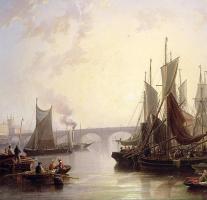 Happy Labor Day! While many nations celebrate workers on May 1st or May Day, US and Canada both celebrate workers rights in early September. It seems a good time to look at the nautical origin of the word “strike,” referring to workers withholding their labor to demand better wages or conditions.
Happy Labor Day! While many nations celebrate workers on May 1st or May Day, US and Canada both celebrate workers rights in early September. It seems a good time to look at the nautical origin of the word “strike,” referring to workers withholding their labor to demand better wages or conditions.
The first use of the word “strike” as a labor protest dates to April of 1768 when sailors in the Port of Sunderland in Great Britain announced that they would strike the topsails of merchant ships to prevent them from sailing unless wages were increased. The ship owners agreed to their demands. In May, sailors on ships in the Thames followed their example and struck their topsails. The sailors petitioned Parliament and the Lord Mayor for a wage increase. By May 11, fourteen thousand sailors, dock workers, water-men, and coal-heavers marched on Westminster. Soon, all trade on the Thames had been brought to a standstill.
Ironically, the new use of the word strike reversed its previous meaning. In battle, when a ship struck, it was an act of surrender. When the sailors struck, it was an act of defiance. The word strike soon spread to describe any work stoppage.

In the UK and elsewhere today is Merchant Navy day.
Please see:
See – https://www.merchantnavyfund.org/merchant-navy-day/